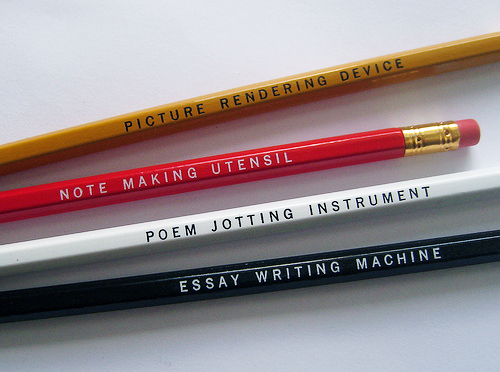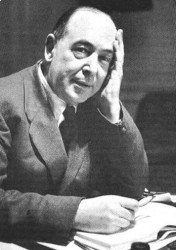Entries Tagged 'writing' ↓
June 17th, 2016 — writing

Count Tolstoy and C.S. Lewis on Writing
Starting with Count Tolstoy:
From the first lines you see the intention behind the writing, and all the details become superfluous—you feel bored. Above all, you know that the author never had any other feeling than the desire to write a story or a novel. [1]
Now compare Lewis:
When every one feels it natural to attempt the same kind of writing, that kind is in danger. Its characteristics are formalized. A stereotyped monotony, unnoticed by contemporaries but cruelly apparent to posterity, begins to pervade it.[2]
NOTES

[1] Tolstoy, Leo. Что такое иÑкуÑÑтво? Chto takoye iskusstvo?  (What is Art?) 1897. Translated by Richard Pevear and Larissa Volokhonsky. NY: Penguin. 1995 . XIV, 117.
[2] Lewis, Clive Staples. The Allegory of Love: a Study in Medieval Tradition. Oxford, UK: Clarendon. 1936. Second Edition. 1946.  232.
March 18th, 2011 — Criticism, writing

See also Second of Three Proposals: Toward a Frankenstein-like Poetics
Third of Three Proposals: Toward Reconciling a Poetics of Ignorance with a Frankensten-like Poetics
1.0 We accept De Quincy’s demarcation[1] for all books in the Library of Babel[2]: There are “books of knowledge†and “books of power.â€
1.1 If books of power are not books of knowledge, they are, in some sense, “books of ignorance.â€[3]
1.2 A writer who follows (or applies) a poetics of ignorance produces books of ignorance.
1.3 When applying a poetics of ignorance, the writer should not “write what he knowsâ€â€”on the contrary: he should write what he doesn’t know. As author he must advertise his avoidances and make his text transparent by unveiling, confessing that which he knows not.
2.0 Because books of power are also books of ignorance, whenever an author attempts to beckon (and reckon) Truth, it tends only to bore the reader. This is because generally, truths and beliefs preached by the writer, or portrayed by his characters drive away the reader’s attention. The presence of truth drives a reader’s attention to halt, stop, stay static. Conversely, any ideas unknown to the reader, unfamiliar (novel) ideas to which the reader is ignorant, tend to intrigue the reader.
2.1 “Doubtâ€, for readers, includes all ideas unknown, unfamiliar, or novel (and intriguing) to them. Doubt is a stimulus for readers—it stimulates their attention, spurs intrigue, births curiosity, channels wonder, and drives their attention to continuing its quarrying.[4] Following a poetics of ignorance allows a writer to cultivate, articulate intriguing doubts that will stimulate readers onward, page after page.
3.0 Writers of books of ignorance must learn to display novelty: hence the name of the literary form, the Novel. Writers must display novelty, not for the sake of notoriety but rather for displaying their own wonderment at that novelty. When a writer acknowledges novelty, she conveys ignorance to her reader. Anything the writer considers novel must be, in some sense, unfamiliar, because those things unfamiliar to her are the things to which she is ignorant and curious about.
3.1 According to Peirce,[5] and contrary to Descartes, the writer cannot know her unknowns (or the things to which she is ignorant)—but she can know her doubts:
It cost me much Trouble to explain to him what I was doing; for the Inhabitants have not the least Idea of Books or Literature…. It was with some Difficulty, and by the help of many Signs, that I brought him to understand me. He replied, That I must needs be mistaken, or that I said the thing which was not. (For they have no Word in their Language to express Lying or Falsehood.)
––Jonathan Swift, Gulliver’s Travels (1726), IV, iii.
Whereof one cannot speak, thereof one must be silent.
––Ludwig Wittgenstein, Tractatus Logico–Philosophicus (1921), § 7.0.
[T]here are known knowns; there are things we know we know. We also know there are known unknowns; that is to say we know there are some things we do not know. But there are also unknown unknowns––the ones we don’t know we don’t know.
––Donald Rumsfield, Department of Defense News Brief for February 12, 2002.
Â
[1] De Quincy, Thomas. [“The Literature of Knowledge and the Literature of Power.â€] a.k.a. “Letters to a Young Man whose Education has been neglected.†London Magazine, March, 1823. Masson, x. 46. Quoted from De Quincy’s Literary Criticism. ed. Helen Darbishire. 1909. H. Frowde, London.
[2] In his fictional short story “The Library of Babel†(1941) Borges begins: “The universe (which others call the Library).†(See Ficciones, 1956. Trans. and ed. by Anthony Kerrigan, Grove Press. 1962. pp. 79–88.)
Borges elsewhere calls it “the utopia of the Total Library†and that it contains:
Everything: but for every sensible line or accurate fact there would be millions of meaningless cacophonies, verbal farragoes, and babblings…. The vast, contradictory Library, whose vertical wildernesses of books run the incessant risk of changing into others that affirm, deny, and confuse everything like a delirious god. (Borges, Jorge Luis. “The Total Library.†(1939). Selected Non–fictions. Ed. and trans. by Eliot Weinberger. Penguin Books. 1999. pp. 214–216.)
[3] De Quincy claims that one kind of opposite to a “book of knowledge†would be a “book of pleasure†or amusement, yet he finds a truer antithesis (or opposite nature) to be a “book of power.†The true nature of our First Proposal seems to be a bit “Gnostic†considering we have set gnosis (knowledge) against agnosis (ignorance).
“We generally know when we wish to ask a question and when we wish to pronounce a judgment, for there is a dissimilarity between the sensation of doubting and that of believing…. The irritation of doubt causes a struggle to attain a state of belief.â€
––The Fixation of Belief (1877).
“Most frequently doubts arise from some indecision, however momentary, in our action.â€
––How to Make Our Ideas Clear (1878).
While doubt makes a reader, on the other hand, gout makes the writer. At this point a “poetics of pain†may come into play—one that has elsewhere been articulated by Nietzsche in his Genealogy of Morals (1877).
[5] From Peirce’s Some Consequences of Our Four Capacities (1868):
In some, or all of these respects, most modern philosophers have been, in effect, Cartesians. Now without wishing to return to scholasticism, it seems to me that modern science and modern logic require us to stand upon a very different platform from this.
1. We cannot begin with complete doubt. We must begin with all the prejudices which we actually have when we enter upon the study of philosophy. These prejudices are not to be dispelled by a maxim, for they are things which it does not occur to us can be questioned. Hence this initial skepticism will be a mere self-deception, and not real doubt; and no one who follows the Cartesian method will ever be satisfied until he has formally recovered all those beliefs which in form he has given up. It is, therefore, as useless a preliminary as going to the North Pole would be in order to get to Constantinople by coming down regularly upon a meridian. A person may, it is true, in the course of his studies, find reason to doubt what he began by believing; but in that case he doubts because he has a positive reason for it, and not on account of the Cartesian maxim. Let us not pretend to doubt in philosophy what we do not doubt in our hearts.
2. The same formalism appears in the Cartesian criterion, which amounts to this: “Whatever I am clearly convinced of, is true.” If I were really convinced, I should have done with reasoning and should require no test of certainty. But thus to make single individuals absolute judges of truth is most pernicious. The result is that metaphysicians will all agree that metaphysics has reached a pitch of certainty far beyond that of the physical sciences; — only they can agree upon nothing else. In sciences in which men come to agreement, when a theory has been broached it is considered to be on probation until this agreement is reached. After it is reached, the question of certainty becomes an idle one, because there is no one left who doubts it. We individually cannot reasonably hope to attain the ultimate philosophy which we pursue; we can only seek it, therefore, for the community of philosophers. Hence, if disciplined and candid minds carefully examine a theory and refuse to accept it, this ought to create doubts in the mind of the author of the theory himself.
3. Philosophy ought to imitate the successful sciences in its methods, so far as to proceed only from tangible premisses which can be subjected to careful scrutiny, and to trust rather to the multitude and variety of its arguments than to the conclusiveness of any one. Its reasoning should not form a chain which is no stronger than its weakest link, but a cable whose fibers may be ever so slender, provided they are sufficiently numerous and intimately connected.
4. Every unidealistic philosophy supposes some absolutely inexplicable, unanalyzable ultimate; in short, something resulting from mediation itself not susceptible of mediation. Now that anything is thus inexplicable can only be known by reasoning from signs. But the only justification of an inference from signs is that the conclusion explains the fact. To suppose the fact absolutely inexplicable, is not to explain it, and hence this supposition is never allowable…. We have no conception of the absolutely incognizable. These propositions cannot be regarded as certain; and, in order to bring them to a further test, it is now proposed to trace them out to their consequences.
October 8th, 2010 — writing
September 15th, 2010 — writing
September 14th, 2010 — writing

We don’t know much about Angus McDiarmid, except that he’s been called “the world’s worst author.†His 1815 book Striking and Picturesque Delineations of the Grand, Beautiful, Wonderful, and Interesting Scenery Around Loch–Earn is a bewildering mess of bad grammar and obscure language — apparently he composed it in his native Scottish Gaelic and then salted it with impressive words from an English dictionary, without much regard to their parts of speech:
The foresaid high Grampian mountains abounded with spasmodiac opening, or excavated parts, that if a loud cry made at accommodious distant, they would sounded the same in such miraculous manner, that one apt to conceive that each parts of those spasmodiac rocks imbibed the vociferation which is depressing gradually the sonorofic sound to the expiry thereof.
via “An Untaught Highlander†| Futility Closet.
August 7th, 2010 — publishing, writing
July 5th, 2010 — writing
March 3rd, 2010 — Language, reading, writing
February 9th, 2010 — book blogging, Criticism, writing

Back to Ted Genoways’s “Death of Fiction?” article in Mother Jones, which has, apparently, generated chatter among book bloggers. Bookbread noted earlier that Genoways concluded his piece with some tart words for today’s American fiction writers, words much inline with Rebecca West’s call for abusive criticism, and equally applicable to our country’s book critics:
I’m not calling for more pundits—God knows we’ve got plenty. I’m saying that writers need to venture out from under the protective wing of academia, to put themselves and their work on the line. Stop being so damned dainty and polite. Treat writing like your lifeblood instead of your livelihood. And for Christ’s sake, write something we might want to read.
Several book bloggers, however, don’t like what they’ve read recently from Ted Genoways, as he argues over the decrease of readership for literary magazines (or is it America’s decrease for things literary?).
George at Bookninja posts “The Death of Fiction†and notes:
[Even] as fiction has become a common pastime pursuit for the vocationally undecided idly rich (re MFA prgs), its viability as a commercial venture has fallen further than ever.
Tolmsted of Booksexy comments on George’s Bookninja post (and thereby Genoways’) and wonders:
Realistically, what were the actual circulation numbers [for literary magazines] to begin with? How much of an impact did they really have? With or without those magazines, catching a break in the literary world will always be a crap shoot.
On the other hand, over at The Reading Experience, in a post entitled “Rescuing Public Discourse,†Daniel Green confesses:
I actually agree with Genoways that there are too many litmags publishing too much perfunctory work, but that these magazines have proliferated because the demand for postmodernism is so insistent seems to me patently absurd….
The connection Genoways sees between issues-focused fiction and larger audiences for literary magazines remains, to say the least, unexplored. Unless he’s suggesting that litmags convert themselves into outlets for journalism rather than fiction: “With so many newspapers and magazines closing, with so many commercial publishers looking to nonprofit models, a few bold university presidents could save American literature, reshape journalism, and maybe even rescue public discourse from the cable shout shows and the blogosphere.†This concern for “public discourse†seems more immediate to Genoways than his ostensible concern for fiction or for literary magazines and their loss of audience.
Lastly, “How Many Times Can We Kill Fiction?†by Brian Ray contains much blather and froth but still manages to recognize:
Genoways bewails how in “the midst of a war on two fronts, there has been hardly a ripple in American fiction.†But that’s only because the world has yet to see my retelling of Joseph Conrad’s Heart of Darkness, which instead of sailing along the Congo will follow the mission of a lieutenant sent to whack a colonel gone mad on power who’s established himself as a demagogue among Taliban chieftains. Don’t worry, Ted. I’m going to show America that plenty remains to be said about foolish wars run by colonial powers. It’s not the same story told over and over again.
February 5th, 2010 — writing

In a Jan. 29, 2010 column of the London Telegraph, “When Fiction Breaks Down,” John Lanchester argues that readers rarely come across a story that focuses on a character’s occupation because modern jobs are too complicated for novel readers and their writers.
Initially this sounds absurd, but as an American, Bookbread often misses implied or understated references to the institutional caste-class-clashes of merry ole England. Perhaps there is sense to be made of Lanchester assuming the majority of modern day workers engage in their productivity via complicated, non-novelistic jobs.
But just because Lanchester reduces readers of novels to crass careerists (unworthy of mention in fictional long form) doesn’t imply that twenty-first century writers should delve into the peasant’s trough to discover and recover the details of homesteading, as younger readers encounter in the Little House books of Laura Ingalls Wilder. No, Bookbread must countercheck and ask: Aren’t most of today’s jobs uncomplicated, boring, tedious—all the things a writer tries to avoid in his or her writing—and that one of the principle responsibilities of novelists is to enchant the reader by escaping that boredom?
In “Good Readers and Good Writers,†Nabokov observes:
There are three points of view from which a writer can be considered: he may be considered as a storyteller, as a teacher, and as an enchanter. A major writer combines these three—storyteller, teacher, enchanter—but it is the enchanter in him that predominates and makes him a major writer. . . .The three facets of the great writer—magic, story, lesson—are prone to blend in one impression of unified and unique radiance, since the magic of art may be present in the very bones of the story, in the very marrow of thought.â€
Yes, sometimes such enchanting requires fantasy and absurdity peppered with philosophy, but that doesn’t mean novelists should omit writing about the occupations of characters that readers can then relate to. Otherwise there would be no need to read about the surveyor’s inability to measure in Kafka’s The Castle (1926), nor The Old Man and the Sea (1952) and Hemingway’s focus on Cuban fishermen, nor the duties of butlering described in Ishiguro’s Remains of the Day (1989).
Bookbread was not the first to recognize that nobody works for a living in Ulysses (1922), but because Lanchester’s entire exordium waxes nostalgic—how writers don’t have real bosses—readers quickly conclude the rest of the article contains little beyond remembrances of literary things past, things that really have no relevance to current and would-be twenty-first century writers or their readers.
Lanchester, however, does preach a bit of literary gospel when he explains:
The world is full of interesting things that don’t fit inside traditional fictional forms. That is because a novel has to seem true. It doesn’t have to be factually or literally true and the kind of truth it seeks can be fantastical, wild, unearthly, illogical, dreamlike, incoherent, even mad—but it does have to feel true. It has to generate a world of its own and create a satisfying internal order within that world, on that world’s own, mysterious, innate terms.
Alas, Lanchester tries (and fails) to create a formula via Venetian voodoo:
Freud said that the two criteria of mental health were the ability to love and to work. The first of those impulses is amply chronicled in the world of fiction—indeed, exhaustively so, since there are shelves and shelves of books that are essentially all about love. The world of work barely features.

UPDATE:
D.G. Myers’s “Sex and the Novel” on A Commonplace Blog goes completely against Lanchester’s Freudian formulation, claiming that when it comes to sex:
Few novelists have treated it as an idea. At best it represents a getaway from ideas.
Myers then creates his own formula in a follow up:
The twentieth-century novel became an either/or. Either it included plenty of sex scenes, or it ignored human sexuality altogether.
The issue concerns what (if any) ideas have been conjured by the word “sex” in a context of twentieth-century English language fiction. Perhaps (like work) sex in the twenty-first century is something too inane or complicated for novel readers and writers to expose themselves to.
Being that Bookbread comes from the Miller/Mailer school, the question beckons:  Who are we to blame for “genital friction”? Freud? Joyce? Henry Miller?  Bookbread want a scapegoat for the novelistic proliferation of belly slapping.
In other readings:  An essay “Our Boredom, Ourselves,” Jennifer Schuessler of Sunday New York Times Book Review provides a recent example of a novelist writing about occupations, and becoming bored:
In April 2011, the limits of literary boredom will be tested when Little, Brown & Company publishes “The Pale King,â€Â David Foster Wallace’s novel, found unfinished after his suicide in 2008, about the inner lives of number-crunching I.R.S. agents. An excerpt that appeared last year in The New Yorker depicts a universe of microboredom gone macro: “He did another return; again the math squared and there were no itemizations on 32 and the printout’s numbers for W-2 and 1099 and Forms 2440 and 2441 appeared to square, and he filled out his codes for the middle tray’s 402 and signed his name and ID number. . . .â€
Whatever to make Wallace, at least Schuessler gets it right in her conclusion:
After all, if it weren’t for all the boring books in the world, why would anyone feel the need to try to write more interesting ones?
NYR: Franz Kafka, The Castle / David Foster Wallace, The Pale King.

Nabokov, Vladimir. “Good Readers and Good Writers.†Lectures on Literature. (1980). Ed. by Fredson Bowers. Harcourt Brace Jovanovich, NY. (1982). pp. 5–6








